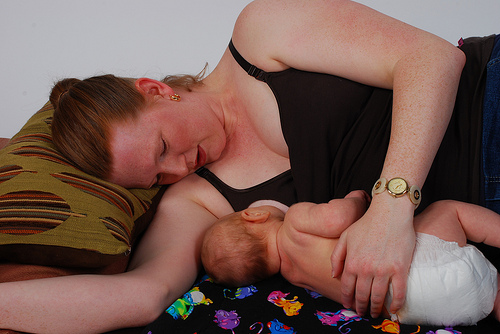Breastfeeding is a broad topic, this is where this blog comes in. This monthly series by Le Leche Leader Bec Taylor, who shares her ever growing knowledge on the subject will be beneficial for soon to be parents.
“I don’t think I have enough milk for my baby!” is one of the most common concerns new mothers have. It is also usually the number one reason mothers offer supplements or give up breastfeeding altogether.
Alongside an increase in your baby’s head circumference and length, there are only two accurate ways to measure if an exclusively breastfed baby is receiving enough milk:
1) increasing weight gain and
2) adequate wet and dirty diapers.
Up, up, up goes the scale!
It is expected that the average, exclusively breastfed baby will gain between at least 170-330grams (on average 8 ounces/245 g) per week after the fourth day of life and regain their birth weight after about 10-14 days.
For an older baby, the average acceptable weight gain per week is as follows:
Ages 2-4 months – 110-330g
Ages 4-6 months – 70-140g
Ages 6-12 months 40-110g
You can see that there is a very large range of ‘normal’ growth.
Count the diapers!
Once your milk comes in, usually on the third or fourth day, your baby should begin to have 6-8 wet cloth diapers (5-6 wet disposable diapers) per day. (An easy way to feel the weight of a wet disposable diaper is to pour 2-4 tablespoons of water in a dry diaper.)
Your baby’s stool will transition to yellow/ mustard-like bowel movements around the end of the first week. Consistently green, watery and foamy stools need to be monitored closely as they may be caused by a low intake of hindmilk, referred to as foremilk-hindmilk imbalance or “oversupply syndrome.”
False alarm!
The following normal baby or maternal behaviors often falsely make mothers doubt their milk supply:
1. Your baby wants to nurse all the time
2. You cannot pump very much milk.
3. Your breasts no longer leak milk and/or usually feel soft and ‘empty’.
4. Your baby is fussy in the evenings and wants to nurse more often.

If your doctor deems it medically necessary for your baby to be supplemented until your supply increases, your pumped milk is the best choice of supplement if you can pump as much milk as your baby needs. You can give your pumped milk by spoon, cup, or with a nursing supplementer so as to avoid nipple confusion in your baby.
Happily, the vast majority of low milk supply issues are easily overcome with better breastfeeding management
Actions to take if you feel concerned about your milk supply
1. Offer more frequent feedings
Milk is created on a supply and demand basis. The more your baby breastfeeds, the more prepared your breasts will be to supply the milk she needs. A newborn baby needs at least 8-12 feeds in a 24 hour period. Mothers are often told to ‘get that baby on a schedule’ or to hold off on feedings in order to ‘make the baby more hungry’. When in fact, the more the baby breastfeeds, the better! If your breasts are not ‘asked’ to create more milk by the baby actively nursing, your brain tells your breasts to stop making milk. Full breasts slow down milk production, frequently drained breasts enhance milk production.
2. Let your baby set the pace
Offer both breasts at each feeding. Allow your baby to stay at the first breast as long as he is actively sucking and swallowing. Offer the second breast when baby slows down or stops. “Finish the first breast first,” is a good general rule. (This technique gives your baby lots of the fatty “hindmilk.”) Your baby should end the feeding. He may do this by falling asleep and detaching from the breast after about 10 to 30 minutes of active sucking and swallowing. Try switch nursing.
3. Check your baby’s latch and your positioning
A baby who is not latched onto the breast correctly or is positioned awkwardly cannot effectively drain your breast. Listen to your baby’s swallowing sounds to make sure they are audible as she is breastfeeding.

4. Avoid supplementing your baby or offering a pacifier
Every time your baby receives a bottle (with water, formula or any other liquid, including pumped breastmilk), it signals to your breasts to produce less milk. Likewise, pacifiers can affect your baby’s latch and decrease the amount of time spent at the breast, both of which can lead to a reduction in milk production.
5. Call an LLL Leader
If you are worried about your milk supply, emailing or calling your LLL Leader can give you a chance to discuss the issue and problem solve together. Even better, come along to an LLL Series Meeting and talk with other mothers to see the wide range of normal babyweight gain and nursing patterns.
La Leche Leader, Bec Taylor, is a woman of many hats – WAHM to two children under 5, Masters of Teacher Librarianship student, scrapbooker, avid reader, wife and a painfully eternal optimist. Australians by birth and travellers by nature, Bec and her educator husband have happily lived and taught overseas for most of their adult lives. Bec is blessed to live in walking distance to both her parents as well as her brother and his family. It is her pleasure and privilege to support mothers through her role in LLL.
Photos: Courtesy of Le Leche League, Mothering Touch (Flickr)




